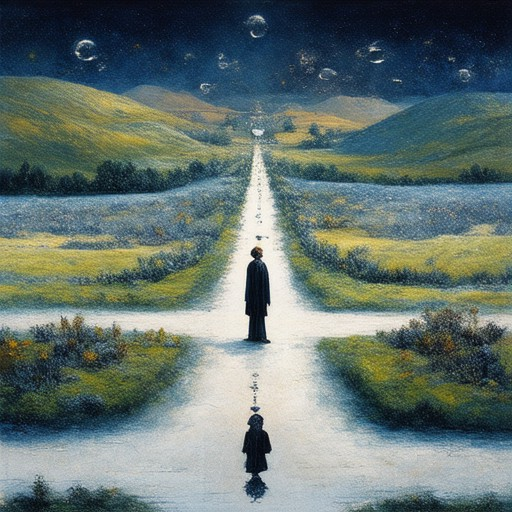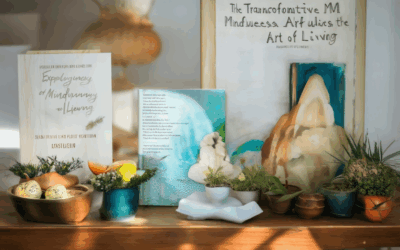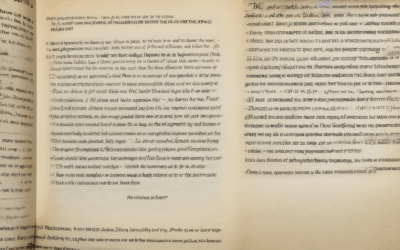In a world brimming with uncertainties, the quest for self-discovery remains a timeless journey toward authenticity and purpose. Reflecting on one’s inner self is not merely a passing thought but a profound process that shapes our lives, guiding us toward clarity, fulfillment, and meaningful existence. Understanding the intricacies of self-reflection allows individuals to delve deeper into their true selves, uncovering hidden strengths, passions, and life purposes. This art of introspection is a gateway to personal growth, enabling individuals to navigate life’s challenges with resilience and grace. Whether through journaling, mindfulness, or exploring nature’s whispers, reflections on finding oneself offer invaluable insights into our being. By embracing this journey, we unlock the potential to live authentically, making informed decisions, and fostering deeper connections with ourselves and the world around us. The exploration of self-reflection extends beyond individual experiences, encompassing themes of spirituality, life purpose, and everyday realities, providing a holistic approach to understanding our existence. Through practical advice and real-life examples, this article invites readers to embark on their own journey of self-discovery, revealing the transformative power of reflecting on who they are and who they aspire to become.
Key Takeaways
- Journaling: Daily writing about thoughts, emotions, and experiences to track changes and gain deeper insights.
- Reflection Apps: Utilize tools like Day One to structure journaling with prompts.
- Photo Review: Organize photos into albums to trigger memories and emotions.
- Conversations: Discuss life with trusted individuals for perspective on growth and values.
- Guided Exercises: Use tools like “The Hero’s Journey” to navigate significant life moments.
- Exploring Values/Beliefs: Reflect on how these have evolved over time.
- Creative Expression: Express emotions through art or music, even with simple sketches or notes.
- Workshops/Courses: Enroll in personal development workshops for structured guidance.
- Dedicating Time: Allocate weekly time for reflection, starting with brief daily sessions.
- Four Steps in Self-Reflection:
- Look: Examine thoughts, feelings, and behaviors to gain insight into mindset and actions.
- Think: Engage in critical analysis to evaluate choices and outcomes.
- Learn: Derive lessons and growth from reflections to guide future decisions.
- Plan: Develop strategies and goals based on insights for personal development.
Reflection is a versatile tool applied across various aspects of life, enhancing understanding and growth.

How to Start a Reflection About Yourself
To begin reflecting on yourself effectively, consider the following organized approach:
- Set Clear Intentions : Determine your reasons for reflecting. Whether for personal growth, self-awareness, or exploring life’s purpose, having a clear intent will guide your focus.
- Engage with Thoughtful Questions : Ask yourself profound questions like:
- “What brings me joy?”
- “What do I struggle with?”
- “What aspirations do I have for my life?”
- Reflect on Life Events : Consider significant past experiences and how they’ve influenced your character and decisions. Balance this by focusing on positive aspects and learning from challenges without dwellin
- Assess Daily Habits and Values : Evaluate if your daily routines align with your core values. Identify areas for improvement and set personal goals based on this reflection.
- Create a Consistent Routine : Dedicate specific times each day for reflection, such as mornings or evenings, to foster consistency without making it feel like a task.
- Practice Self-Compassion : Embrace your imperfections and approach reflection with kindness. Avoid self-criticism and instead cultivate compassion towards yourself.
- Foster a Conversational Approach : Engage in a dialogue with yourself, using open-ended questions to encourage introspection and natural exploration of your thoughts.
- Align Reflection with Long-Term Goals : Connect your reflections with your aspirations, assessing whether your current path aligns with your desired outcomes and adjusting accordingly.
- Seek Inspiration from Others’ Methods : While maintaining your own exploration, consider gentle guidance from external resources or methods, ensuring they resonate with your personal journey.
- Embrace the Process : Understand that reflection is a gradual journey requiring patience. Allow yourself the space to grow and evolve through this practice.
By integrating these steps, you can embark on a meaningful reflection journey, enhancing self-awareness and guiding your personal development.
Why is Finding Yourself Important?
Understanding yourself is a vital process that allows you to live a more fulfilling and meaningful life. It involves exploring your interests, strengths, and values to better understand who you are and what you stand for.
Exploring Your Identity
Finding yourself begins with discovering your true identity. This includes understanding your personality traits, beliefs, and life goals. Knowing who you are helps you make decisions that align with your authentic self, leading to greater satisfaction and harmony in life.
Purpose and Fulfillment
When you take the time to find yourself, you gain clarity about your purpose in life. This purpose can guide your career choices, relationships, and overall approach to existence, helping you feel more fulfilled and confident in your daily actions.
Growing Through Self-Discovery
Self-discovery is a continuous journey that fosters personal growth. As you learn more about yourself, you develop greater self-awareness and emotional intelligence, enabling you to navigate life’s challenges with resilience and grace.
Building Stronger Relationships
Knowing yourself better allows you to communicate more effectively with others. This self-awareness helps you set healthy boundaries, express your needs, and connect deeply with those around you, fostering more meaningful relationships.
Embracing Change and Adventure
Finding yourself often leads to a willingness to embrace change and explore new opportunities. This courage to step out of your comfort zone can lead to exciting adventures and help you grow in ways you never imagined.
Conclusion
In summary, finding yourself is essential for living a balanced, purposeful life. It empowers you to make informed decisions, build strong connections, and pursue your passions with confidence. Take time today to embark on this transformative journey and discover the amazing individual you were meant to be.

Examples of Self-Reflection
Self-reflection involves examining one’s thoughts, feelings, and actions to understand oneself better. Here are some examples:
- Personal Growth: Reflecting on personal achievements and challenges to identify areas for improvement. For instance, recognizing strengths in public speaking and acknowledging weaknesses in time management.
- Career Decisions: Considering past experiences and skills to guide future career choices. Someone might reflect on what roles they thrived in and what environments they excelled in.
- Relationship Dynamics: Analyzing interactions with others to understand communication styles and emotional responses. This could involve realizing patterns in conflicts or misunderstandings.
- Mindfulness Practice: Engaging in moments of introspection during daily activities, such as journaling or meditating, to gain insight into one’s mental state and emotional well-being.
- Goal Setting: Reviewing past goals to evaluate progress and set new objectives. This process helps in aligning aspirations with personal values and long-term vision.
Self-reflection is a powerful tool for personal development and can be practiced regularly through journaling, mindfulness, or simply spending quiet time alone with one’s thoughts. It allows individuals to connect with their true selves and make more informed decisions moving forward.
For more insights and resources on self-reflection, visit our website .

How to Find Self-Reflection
To find self-reflection, consider these methods:
- Journaling : Begin by writing daily about your thoughts, emotions, and experiences. Track changes over time to gain deeper insights.
- Use Reflection Apps : Try apps like Day One or Reflective to structure your journaling and provide prompts.
- Review Photos : Organize photos into albums and revisit them to trigger memories and emotions.
- Engage in Conversations : Discuss your life with trusted individuals to gain perspective on your growth and values.
- Guided Exercises : Utilize online tools like “The Hero’s Journey” to navigate significant life moments.
- Explore Values and Beliefs : Reflect on how your values and beliefs have evolved over time.
- Creative Expression : Use art or music to express emotions, even if simply sketching or noting music-induced feelings.
- Seek Workshops/Courses : Enroll in personal development workshops or courses for structured guidance.
- Dedicate Time : Allocate weekly time for reflection, starting with brief daily sessions to foster consistency.
By experimenting with these approaches, you can uncover unique insights and enhance your self-awareness.
Four Steps in Self-Reflection
Here are the four essential steps involved in self-reflection:
- Look
- Examine your thoughts, feelings, and behaviors to gain insight into your mindset and actions. Reflect on your reactions to various situations and identify patterns or recurring themes.
- Think
- Engage in critical thinking to analyze your reflections. Consider the underlying reasons behind your actions and evaluate the outcomes of your choices. Ask yourself questions like, “What went well?” and “What could I have done differently?”
- Learn
- Derive lessons and growth from your reflections. Identify strengths and areas for improvement. Use these insights to guide future decision-making and personal development.
- Plan
- Develop strategies or goals based on your reflections. Create a roadmap for addressing challenges and opportunities. Share your findings with others to foster collaboration and support.

Examples of Reflection
- Personal Development: Reflection is often practiced through journaling, meditation, or self-observation. For instance, individuals may reflect on their daily experiences to identify patterns, strengths, or areas for growth.
- Educational Context: In classrooms, teachers encourage reflection through activities like writing journals or discussing lessons. Students learn to analyze their thoughts and actions, fostering critical thinking and problem-solving skills.
- Psychological Well-being: Reflecting on past experiences helps individuals process emotions and make healthier decisions. For example, someone might reflect on why they chose a certain career path to understand their motivations and goals.
- Leadership and Decision-Making: Leaders often engage in reflection before making important decisions. This practice involves evaluating past successes and failures to inform future choices, ensuring informed and strategic decisions.
- Technology and Innovation: Reflection in project management involves reviewing past projects to identify what worked and what didn’t. This helps teams improve processes and outcomes, leading to more efficient future endeavors.
Reflection is a powerful tool that enhances understanding, learning, and growth across various aspects of life.




0 Comments